this post was submitted on 25 Jan 2024
990 points (95.2% liked)
Piracy: ꜱᴀɪʟ ᴛʜᴇ ʜɪɢʜ ꜱᴇᴀꜱ
54669 readers
444 users here now
⚓ Dedicated to the discussion of digital piracy, including ethical problems and legal advancements.
Rules • Full Version
1. Posts must be related to the discussion of digital piracy
2. Don't request invites, trade, sell, or self-promote
3. Don't request or link to specific pirated titles, including DMs
4. Don't submit low-quality posts, be entitled, or harass others
Loot, Pillage, & Plunder
📜 c/Piracy Wiki (Community Edition):
💰 Please help cover server costs.
 |
 |
|---|---|
| Ko-fi | Liberapay |
founded 1 year ago
MODERATORS
you are viewing a single comment's thread
view the rest of the comments
view the rest of the comments


Or many service providers competing on price, quality of service and features, not competing on exclusivity like they do now.
Like grocery stores. Imagine if only one chain has the exclusive rights to sell potatoes and another one has rights to pasta. They can ask whatever price they want, because what you gonna do? Go to another store to get your 'taters cheaper? Hah, you'll cry and you'll pay what we ask! (BTW, growing your own potatos and sharing them with your neighbor infringes on our rights and is illegal. We'll sue you to oblivion if we catch you doing it.)
I think a better example is just physical media sales. Retailers generally all carried the same physical stock. You would occasionally see special editions or something that might only be available at certain stores, but it was extremely rare to only be able to buy certain titles at certain retailers.
Or the prime example: movie theaters. We passed regulations to prevent movie theaters from being bought by studios and used as exclusive avenues for the distribution of certain media. You had a movie, you released it to all movie theaters that wanted it, you couldn't just make a deal or buy out Regal or Cinemark, or make your own theater. It ensured a level playing field.
One of the biggest problems with streaming that we have simply refused to acknowledge is that the safeguards necessary to create a healthy market, the safeguards we've used previously with other distribution models, were never put in place. And we're seeing the fallout of that now.
This is the best take I’ve seen yet, with the benefit that it’s literally already been done.
It’d be interesting to see what would happen if they tried to mandate this now, but I’m sure it’s already too late.
I would think in a way it’s like what happens with the music industry. Don’t get me wrong, that industry has its own problems, but for the vast majority of music, I can listen to it on Spotify, YT music, Apple Music, etc. I don’t need to sign up for Sony+ to listen to their artists, etc.
Same should have happened to the movie industry.
Don't give them ideas!